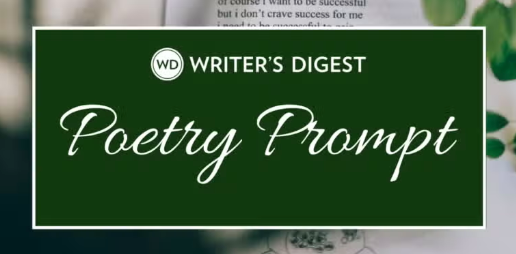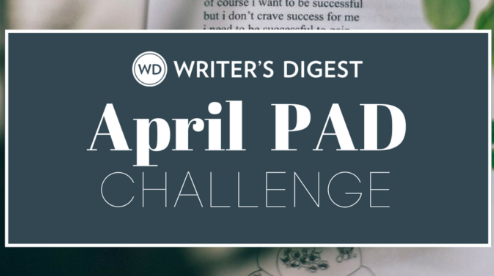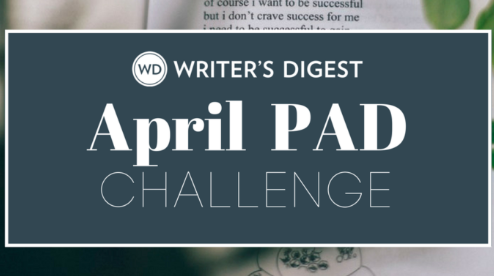Interview With Poet Scott Owens
I’ve been aware of Scott Owens and his poetry for years, and he’s even participated in a previous April PAD Challenge, but I didn’t get to meet him in person…
I've been aware of Scott Owens and his poetry for years, and he's even participated in a previous April PAD Challenge, but I didn't get to meet him in person until earlier this year at the Blue Ridge Writers Conference. While at that event, I got to see Scott perform well in two very different ways. On Friday evening, I watched him give a great reading of his poems. On Saturday, he followed it up with a great presentation on perpetual writing prompts. I'm honored to share him with the Poetic Asides audience.
As you'll see in the interview below, Scott keeps himself very busy in the poetry world from running the Poetry Hickory readings to publishing poems in Wild Goose Poetry Review. His collection Something Knows the Moment was also recently released by Main Street Rag. Here's one of my favorites from that amazing collection:
Naming God, by Scott Owens
To Norman, God was a storm.
What else could he be?
He had seen the storm, after all,
lift the roof off the barn
and plant it sideways, almost whole,
against the stand of scraggly pines
in the corner of the pasture
two hundred yards away.
He had seen it roll cars
two, three, four times
across the fields
in some kind of crazy race
where wheels didn’t matter.
He had seen it topple trees
he knew to be stout enough
to hold himself, three brothers,
just as many cousins,
all at the same time,
not to mention sticks,
rocks, shields of oak
barrel lids and anything else
they carried with them into war.
And through it all he had heard
the old woman, louder
than the storm, naming, God,
help us! God, protect us!
God, don’t take my babies!
*****
What are you currently up to?
I have a new book called Something Knows the Moment just out from Main Street Rag, so I've been giving readings across the state from that. I have another one coming out in March from Future Cycle Press called For One Who Knows How to Own Land. The poems in that one are more "pastoral" than most and center on upstate SC, so I'm looking for reading venues in Greenville, Spartanburg,Columbia, etc.
I'm still teaching at Catawba Valley Community College, still editing Wild Goose Poetry Review, putting together a special "100 Thousand Poets for Change" issue for mid-November that will have poems read at 100TPC events across the state on Sep 24. I'm also editing a new online journal of nonfiction called 234 (www.234journal.com).
I'm still VP of the Poetry Council of NC, coordinating Poetry Hickory, and having a great time with my 6-year old daughter, Sawyer, and our 2-year old Australian Shepherd, Huck. Aside from that I'm paying tuition to Wake Forest and UNCG for our boys, and my wife and I are putting the finishing touches on a tree house that's more impressive than most of the houses I grew up in.
You are super well-published. Do you have a submission routine to help keep track of everything?
Mine is a bit of a hybrid system. I still use the old school technique of creating a folder for each poem and writing on the outside of the folder the date and place the poem was submitted. Those are filed alphabetically, one drawer for those that are currently out and one drawer for those that are currently not out. If they get published, they go to the special filing cabinet. I also keep a pen and paper list of current submissions by journal. All that is to try and not double submit or bug editors with too many submissions too close together. Finally, I keep a spreadsheet of my favorite journals and track submission dates and publication dates so that I don't let any of them get lost in the shuffle. To anyone technologically-savvy I'm sure this sounds hopelessly archaic, but it's comfortable for me, and I love the feel of manilla folders.
Related to the previous question, how do you manage to churn out so many publishable poems? Do you have a writing routine? Magic trick for coming up with ideas?
I haven't been able to have a writing routine since my daughter was born. I do still get up early and do something, but it's just as likely to be preparing her lunch or paying bills as working on poems. I suppose you could say that I treat poems as emergencies. I have my notebook with me all the time, and as soon as a line, image, or idea surfaces, I stop whatever I'm doing and jot it down. It rolls around in my head for a while after that accumulating other scraps of imagery or language, and I jot them down as well. When I do have time to focus a bit more, I'll pull out the notebook and start assembling or tinkering.
The whole process can take as little as a few hours or as long as a few months, but once it is started in the notebook I know it won't get lost. I don't really consciously work too hard on coming up with ideas right now. They seem to be everywhere -- something I see or hear, something I read. A lot of my poetry centers on a handful of "themes" that just won't go away, so I commonly have random thoughts on those themes that work into poems. At other times, when I get stressed out about not writing, I do have several "perpetual prompts" that I use to generate ideas and get me going again.
You’re the editor of Wild Goose Poetry Review. Could you explain your publication and what you like to see in poetry submissions?
Wild Goose is a quarterly online journal of poetry and reviews of poetry. Each issue includes about 2 dozen poems and a half dozen reviews. The journal has been around for 5 years; I've been with it for 3; and I've been sole editor for the last 2. I look for poetry that has an impact on the reader. I want poetry that is purposefully crafted, at least moderately accessible, and uses imagery that leaps off the page into the reader's imagination. I want to see line breaks that make sense, details that haunt the reader, and subjects that matter. I want poetry that makes the readers' body sit perfectly still, maybe not even breathing, while they experience the poem. I like narrative; I like humor; I like political; I like emotion; I like interesting and fresh and new.
In addition to being a poet and poetry editor, you’re also the founder and facilitator of the Poetry Hickory readings. Could you explain what this event is?
Poetry Hickory is a monthly reading series at a local coffeeshop. We have two featured readers (usually they have a new book to sell) and three open mic readers. We just wrapped up our fourth year, and we're still getting 30-50 people at each event -- not bad for a town the size of Hickory. Before each reading we also have Writers' Night Out, which is a networking, sharing, critiquing, and fellowship meeting for anyone interested in writing. The usual group includes both people who have never published anything and several who have multiple books out.
I’m sure you’ve seen a great deal of poets read as part of those Poetry Hickory readings and others. Could you share a tip or two for poets new to reading their poetry to an audience?
For a reading, the poet should consider the limitations and opportunities inherent in a live interaction without a printed text for the audience to view. In other words, choose poems that will work when your listeners can't see the poem. Choose accessibility, humor, vivid imagery, even shock. Keep your selections short. Offer just a bit of information on each poem -- a "way in," something about yourself or the motivation behind the poem -- but don't go on too long. Be animated if you can. Know the poem well enough that you can establish some eye contact without losing your place. Read whatever comes closest to a "performance piece." Have fun, and above all, always come up short -- if they tell you to read for 30 minutes, then read for 25 -- leave them wanting a bit more.
Earlier this year, I know you mentioned your experiences as a judge for a poetry competition. How do you think poets should approach entering poetry competitions?
Humbly. Without expectation. Patiently. The odds are simply not with the writer in most contests. I have judged contests with as many as 600 entries and only 1 winner or as few as 25 entries and 6 winners. Even those lowest numbers mean that 3 out of 4 entries will not win. Fortunately, it always seems that at least half of the entries are not even close to quality work. Still, there are typically quite a few manuscripts that are very deserving, with nothing to separate them in terms of quality. At that point I suspect most judges are moved towards a preferred style or subject matter or perhaps something that feels new and different to them. I don't enter many contests because I simply can't afford all those entry fees. I'm more likely to enter those that at least give me a copy of the winning book or a suscription to a journal just for entering. It's easier to justify the expense that way.
Who (or what) are you currently reading?
Joanna Catherine Scott's An Innocent in the House of the Dead, Paul Hostovsky's A Little Bit in Love a Lot, Tony Abbott's If Words Could Save Us. My favorite recent read is John Lane's Abandoned Quarry.
If you could share only one piece of advice for other poets, what would it be?
Assuming you mean "young" or "developing" poets, I would encourage them to read as much of what is being published right now as they can, to get into or form a networking or critique group, to revise a lot, to carry their notebook with them everywhere and never count on remembering the line or image that just occurred to them, and of course to make writing a means of and a service to living.
*****
Learn more about Scott at one of these online locations:
- www.scottowenspoet.com
- www.scottowensmusings.blogspot.com
- www.poetryhickory.com
- www.wildgoosepoetryreview.com
- www.234journal.com
- www.poetrycouncilofnc.wordpress.com
*****
If you're a poet (or publisher) interested in being featured in a future Poetic Asides interview, send me an e-mail at robert.brewer@fwmedia.com with the subject line: Poetic Asides Interview, and let me know more about yourself (or your poets).
*****
Follow me on Twitter @robertleebrewer
*****
...with the 2012 Poet's Market, edited by Robert Lee Brewer. Hundreds of publishing opportunities, dozens of articles on the craft and business of poeming, and more.
Robert Lee Brewer is Senior Editor of Writer's Digest, which includes managing the content on WritersDigest.com and programming virtual conferences. He's the author of 40 Plot Twist Prompts for Writers: Writing Ideas for Bending Stories in New Directions, The Complete Guide of Poetic Forms: 100+ Poetic Form Definitions and Examples for Poets, Poem-a-Day: 365 Poetry Writing Prompts for a Year of Poeming, and more. Also, he's the editor of Writer's Market, Poet's Market, and Guide to Literary Agents. Follow him on Twitter @robertleebrewer.





